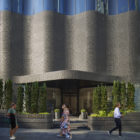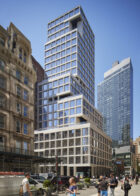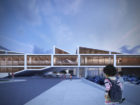01/
As a designer, Olin McKenzie is influenced by his experience of cities—the spaces, patterns, and buildings that contribute to the novelty and wonder of urban living. His architectural sensibility is invested in restraint and clarity, and by the belief that layered work can be most powerfully achieved through an economy of design moves.
When he joined SOM in 2006, Olin initially worked in the education sector, with projects including the Raffles American School in Iskandar, Malaysia, and student activity and athletic facilities for Kuwait University. He went on to design dynamic and influential transportation projects, including Brightline, which encompasses three passenger rail stations in South Florida, and the Philadelphia 30th Street Station District Plan.
I’ve always been fascinated by the power of storytelling in design. Narrative can imbue architecture with meaning and has a magic ability to coalesce the myriad aspects of a project—from program, to culture, to aesthetics—into synthetic union.
A human scale and distinct visual identity are throughlines in Olin’s work. From the curving glass facade which masks the structural columns at Pendry Manhattan West to the locally sourced timber screens that enable passive shading and air flow at the Raffles American School, Olin is known for finding unexpected formal and material solutions that enrich a building’s function and surroundings.
Olin has also focused his attention on a series of commercial office projects that explore new ways of thinking about work. The project at 1245 Broadway, a boutique office tower in the NoMad neighborhood of Manhattan, is rendered in textured, architecturally exposed concrete. The design creates an ecosystem of staggered outdoor terraces, varied and flexible floor plates, and bay windows that frame dramatic views. Working at a larger scale, Olin led the design of the 200-meter-tall headquarters for China’s leading radio and communication systems manufacturer—a monumental building that floats above a civic plaza in Shenzhen.








